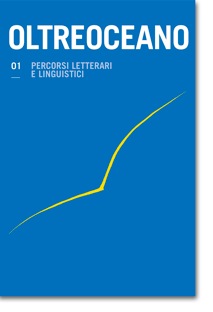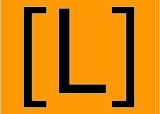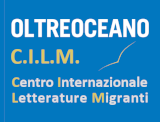Voci dal profondo: lingue e identità plurime in A Furlan Harvest e Linked Alive di Dôre Michelut
Parole chiave:
immigrazione italo-canadese, genitori, figli, Dôre MichelutAbstract
A Furlan Harvest di Dôre Michelut è un tentativo di ridurre il divario che ha separato genitori e figli nel fenomeno dell’immigrazione italo-canadese, il prodotto di un corso di scrittura creativa alla Famee Furlane di Toronto condotto in italiano, inglese e friulano, esente da requisiti specifici relativi al grado di istruzione.
Voices from Within: Plural Languages and Identities in Dôre Michelut’s a Furlan Harvest and Linked Alive
Dôre Michelut’s a Furlan Harvest is the outcome of a writing course held at the Famed Furlane in Toronto and collects the works written in Italian, English and Friulian by a group of immigrant women from various social and cultural contexts. It attempts to reduce the gap between parents and children during the Italian-Canadian immigration process.
Downloads
Riferimenti bibliografici
Bertoli, A. (1993): Strade. The Road. In D. Michelut (Ed.), A Furlan Harvest: an Anthology (pp. 27-28). Laval (Québec): Trois.
Black, A. & Michelut, D. (Ed.), (1990): Linked Alive. Laval (Québec): Trois.
Caroli, B. B., Harney, R. & Tomassi, L. (Eds.) (1989): The Italian Immigrant Woman in North America. Toronto: Multicultural History Society of Ontario.
Coombe, R. J. (1990): Barren Ground: Re-Conceiving Honour and Shame in the Field of Mediterranean Ethnography. Anthropologica, 32, pp. 221-231.
Cornelisan, A. (1976): Women of the Shadows: A Study of Wives and Mothers of Southern Italy. New York: Vintage Books.
Correa-Zoli, Y. (1981): The Language of Italian-Americans. In Ch. Ferguson & S. Brice Heath (Eds.), Language in the U.S.A. (pp. 239-256). Cambridge: Cambridge University Press.
D’Alfonso, A. (1986): The Other Shore. Montreal: Guernica.
Dolby-Stahl, S. (1989): Literary Folkloristics and the Personal Narrative. Bloomington: Indiana University Press.
Falassi, A. (1980): Folklore by the Fireside: Text and Context of the Tuscan Veglia. Austin: University of Texas Press.
Gans, H. (1962): The Urban Villagers: Group and Class in the Life of Italian-Americans. New York: Free Press.
Gilmore, L. (1994): Autobiographics: a Feminist Theory of Women’s Self-Representation. Ithaca and London: Cornell University Press.
Kadar, M. (Ed.), (1992): Essays on Life Writing, from Genre to Critical Practice. Toronto: University of Toronto Press.
Kristeva, J. (1980): Desire in Language: A Semiotic Approach to Literature and Art, 1977. Oxford: Blackwell.
Lispector, C. (1992): The Foreign Legion. New York: New Directions.
Melfi, M. (1998): Office Politics. In M. De Franceschi (Ed.), Pillars of Lace. The Anthology of Italian-Canadian Women Writers (p. 220). Toronto: Guernica.
Michelut, D. (Ed.), (1993): A Furlan Harvest: an Anthology. Laval (Québec): Trois.
Michelutti, D. (1990): Coming to Terms with the Mother Tongue. In C. D. Minni & A. Foschi Ciampolini (Eds.), The Proceedeings of the First National Conference of Italian-Canadian Writers (p. 130). Montreal: Guernica.
Miller, N. (1991): Getting Personal: Feminist Occasions and Other Autobiographical Acts. New York: Routledge.
Morris, P. (1993): Literature and Feminism, an Introduction. Oxford U.K. & Cambridge U.S.A.: Blackwell.
Palmer, P. (1989): Contemporary Women’s Fiction, Narrative Practice and Feminist Theory. Jacksonand London: University Press of Mississipi.
De Franceschi, M. (Ed.) (1998): Pillars of Lace, The Anthology of Italian-Canadian Women Writers. Toronto: Guernica.
Pivato, J. (1994): Oral Roots of Italian-Canadian Writing. In J. Pivato, Echo: Essays on Other Literatures (pp. 66-84). Toronto: Guernica.
Pivato, J. (2005): Elegy for the Future. In A. P. De Luca A. & Ferraro (Eds.), Shaping History, l’identità italo-canadese nel Canada anglofono (p. 75). Udine: Forum.
Pivato, J. (1990): Nothing Left to Say: Italian Canadian Writers. In J. Pivato, Writers in Transition. The Proceedings of the First National Conference of Italian-Canadian Writers (p. 30). Montreal: Guernica.
Portelli, A. (1991): The Death of Luigi Trastulli and Other Stories: Form and Meaning in Oral History. Albany: State University of New York.
De Luca, A. P.& Ferraro, A. (Eds.) (2005): Shaping History, l’identità italo-canadese nel Canada anglofono. Udine: Forum.
Sollors, W. (Ed.), (1989): The Invention of Ethnicity. New York: Oxford University Press.
Minni, D. & Foschi Ciampolini, A. (Eds.) (1990): Writers in Transition. The Proceedings of the First National Conference of Italian-Canadian Writers. Montreal: Guernica.
Downloads
Pubblicato
Come citare
Fascicolo
Sezione
Licenza
Copyright (c) 2007 Oltreoceano - Rivista sulle migrazioni

Questo lavoro è fornito con la licenza Creative Commons Attribuzione - Non commerciale - Condividi allo stesso modo 4.0 Internazionale.
Gli autori si impegnano a rispettare le seguenti condizioni, che s’intendono accettate al momento della sottomissione per la stampa dei propri contributi.
L’invio di un testo implica che esso sia inedito e non in attesa di essere pubblicato altrove.Gli autori si impegnano a rispettare le seguenti condizioni, che s’intendono accettate al momento della sottomissione per la stampa dei propri contributi.
- Qualora venga accettato, l’autore conferisce all’editore il diritto di pubblicarlo e distribuirlo sia in forma cartacea che nell’edizione elettronica in rete. Gli articoli pubblicati saranno scaricabili e resi disponibili in open access.
- Purché segnali correttamente che la prima pubblicazione è avvenuta sulla rivista «Oltreoceano. Rivista sulle migrazioni», l’autore ha facoltà di: a) riprodurre l’articolo in estratti separati o raccolti in volume; b) pubblicare l’articolo nel proprio sito personale o in quello di corsi di insegnamento purché si tratti di siti di natura non commerciale; c) depositare l’articolo in archivi online di carattere non commerciale, legati all’istituzione di appartenenza o come parte di progetti di diffusione non commerciale e open access dei lavori scientifici.
Non è consentita l’utilizzazione dei contributi da parte di terzi, per fini commerciali o comunque non autorizzati. L’editore declina ogni responsabilità sull’uso non autorizzato del materiale pubblicato sulla rivista.













